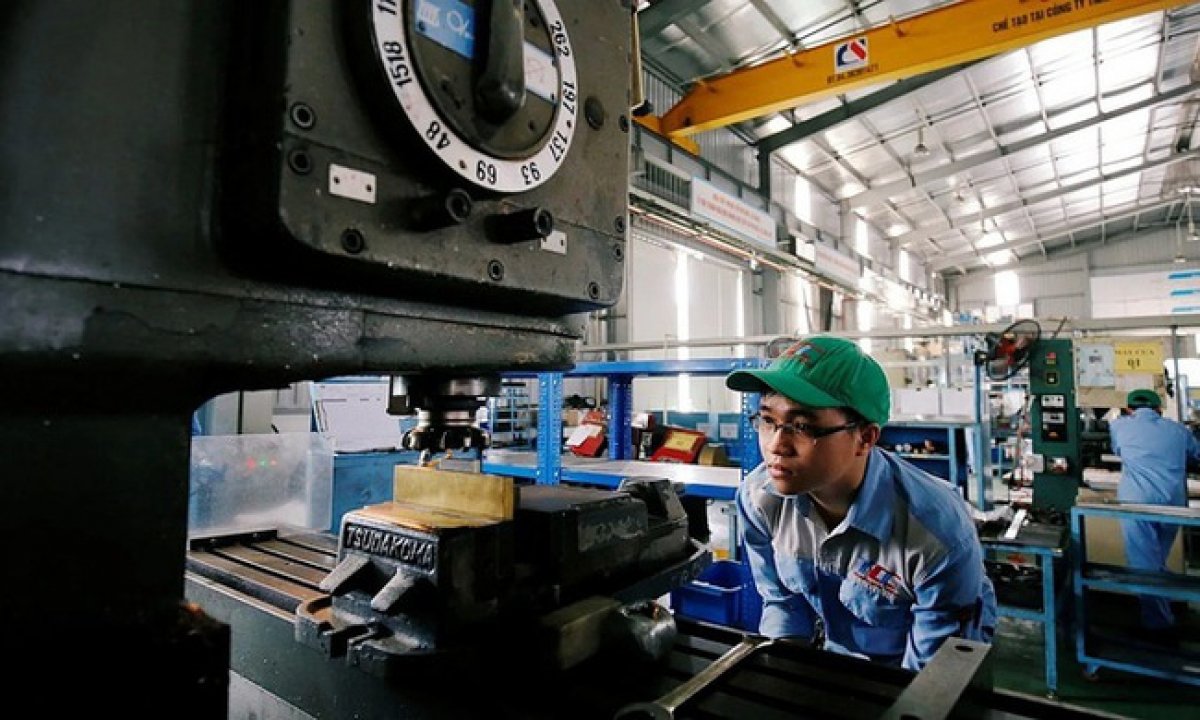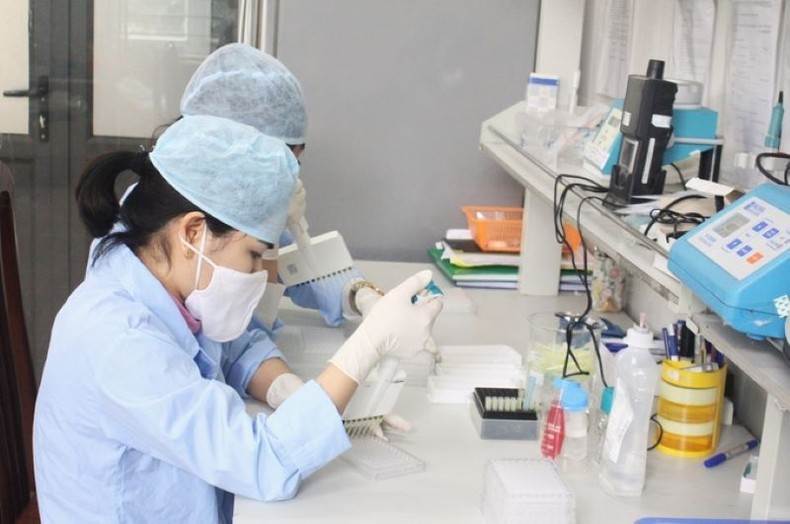Vaccine Inequality Threatens Global Economic Recovery, IMF Warns
| IMF: Vietnam to be fastest-growing ASEAN economy in 2022 | |
| IMF: Vietnam's economy set to grow at 6.5% this year | |
| IMF: Global 2021 GDP growth may reach 5.5% thanks to COVID vaccine |
As reported by Financial Times, the fund still expects overall global growth of 6 percent this year — unchanged from its last projection in April — it said in its latest World Economic Outlook on Tuesday. But it warned that new waves of coronavirus infections since then, including the spread of the Delta variant, have made the outlook more uncertain and uneven.
“Vaccine access has emerged as the principal faultline along which the global recovery splits into two blocs,” the IMF said. Some countries “can look forward to further normalization of activity later this year” but many others “still face resurgent infections and rising Covid death tolls”.
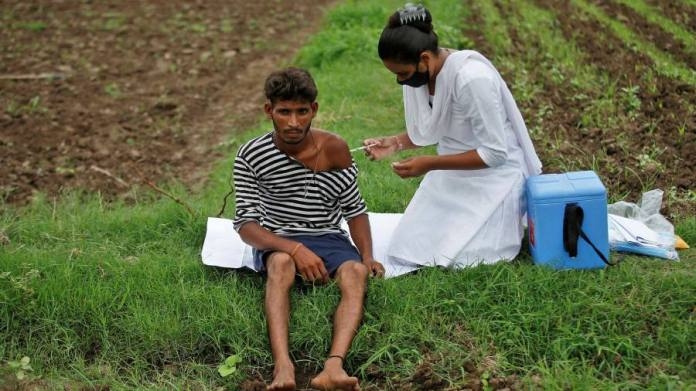 |
| Photo: France 24 |
Even countries on the recovery track should not be complacent about this, the Fund warned: “The recovery . . . is not assured even in countries where infections are currently very low so long as the virus circulates elsewhere.”
The IMF cut 0.4 percentage points off its growth forecast for emerging and developing economies this year, to 6.3 per cent. The gloomier outlook was worst in south-east Asia and south Asia, particularly India.
IMF chief economist Gita Gopinath told the Financial Times: “We’re still in a situation where the pandemic is creating a lot of havoc around the world.”
Although it was clear the Delta variant was “quickly becoming the dominant strain”, the economic impact in wealthier nations was hard to judge, she argued.
“While we are seeing cases go up . . . if you look at hospitalisations and deaths, you’ve seen a far more muted effect . . . We have to see whether this will actually have a big hit on spending patterns, on travel, on confidence effects and so on. And we aren’t seeing that yet,” she said.
By contrast, the IMF increased its forecast for advanced economies’ output growth this year by 0.5 percentage points to 5.6 per cent, with notable upgrades for the US, UK, Canada and Italy. France and Germany were unchanged, while growth expectations for Spain and Japan were downgraded.
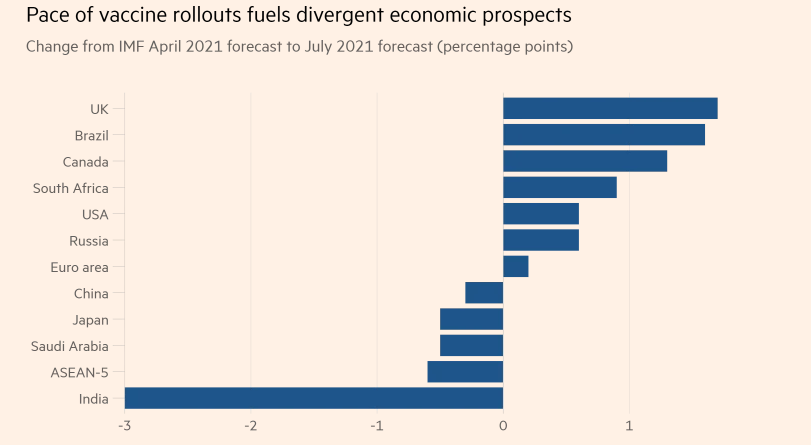 |
| Chart: IMF |
One significant risk the IMF identified was inflationary pressures. Although the world’s major central banks expect the pace of price growth to peak later this year and then ebb, the Fund warned that inflation could turn out to be more persistent than it had anticipated.
There is a risk that this could prompt a more aggressive normalization of central bank policy, which would hit emerging and developing economies particularly hard, it said. “A double hit to emerging market and developing economies from worsening pandemic dynamics and tighter external financial conditions would severely set back their recovery and drag global growth below this outlook’s baseline [scenario],” the IMF said.
However Gopinath said she was “not worried” about the risk of an inflationary spiral in the US, where the Biden administration’s spending plans are expected to fuel the economic recovery.
The IMF upgraded its growth forecasts for the world’s largest economy by 0.6 percentage points this year and 1.4 percentage points next year, to 7 percent and 4.9 percent respectively — on the assumption that Washington’s infrastructure and social spending programs will pass through Congress.
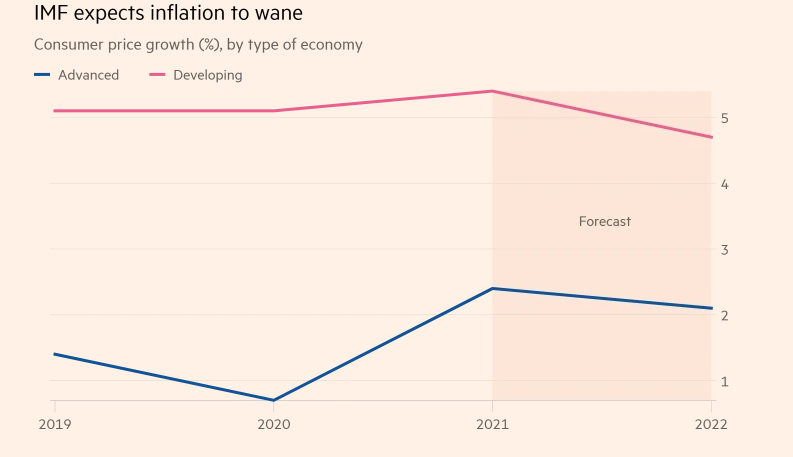 |
| Chart: IMF |
US Federal Reserve policymakers will meet on Wednesday to discuss a possible reduction in the pace of its asset purchases later in the year, as it starts to slow the pace of monetary support for the recovery.
The Fed’s favorite inflation gauge — the core personal consumption expenditures index — is expected to accelerate sharply from its current 3.4 percent level to eventually reach 4 percent. But as transitory supply constraints and other pandemic-related quirks ease, those pressures will fade, with core PCE drifting down to 2.5 percent next year, the IMF forecasts.
“Everything we’ve seen so far is in line with the prediction that inflation comes down next year,” Gopinath said. The Fund’s projections for inflation and employment suggest that US interest rates will start to rise in late 2022 or early 2023, Gopinath said — more quickly than Fed officials have predicted.
Meanwhile, China is set to log growth of 8.1%, a slight downward revision amid fears that its recovery could be losing steam. Projections for economic growth in India received a sizable downgrade following a recent wave of Covid-19 infections. The country’s economy is now expected to grow by 9.5% this year, compared to a 12.5% projection in April, CNN reported.
“Faster-than-expected vaccination rates and return to normalcy have led to upgrades, while lack of access to vaccines and renewed waves of Covid-19 cases in some countries, notably India, have led to downgrades,” IMF chief economist Gita Gopinath said in a blog post.
The IMF cautioned that different levels of policy support from governments could exacerbate the split.
“We are seeing continued sizable fiscal support in advanced economies with $4.6 trillion of announced pandemic-related measures available in 2021 and beyond,” Gopinath said. “On the other hand, in emerging market and developing economies most measures expired in 2020 and they are looking to rebuild fiscal buffers. Some emerging markets like Brazil, Hungary, Mexico, Russia and Turkey have also begun raising monetary policy rates to head off upward price pressures.”
However, even those countries on more solid footing aren’t in the clear, the IMF warned. It pointed to the risks posed by “highly infectious virus variants,” as well as a shock to financial markets, particularly in the United States, if central banks pull economic support sooner than expected.
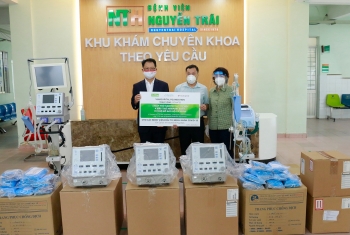 | Famous Artists, Athletes "Help Vietnam Breathe" All hands on deck to fight a once-in-a-lifetime pandemic. |
 | Vietnam News Today (July 28): Food Stamps Allocate Market Time to Hanoi Residents Vietnam News Today (July 28): Covid-19: Daily count hits nearly 8,000, HCM city records 6,318; Food stamps allocate market time to Hanoi residents; More southern ... |
 | A Nurse in the Nick of Time: Man Assists with Childbirth During Lockdown Nobody knew what to do when the woman went into labor. Fortunately, Bui Van Cong managed to cushion the newborn baby who was about to ... |
Recommended
 World
World
Pakistan NCRC report explores emerging child rights issues
 World
World
"India has right to defend herself against terror," says German Foreign Minister, endorses Op Sindoor
 World
World
‘We stand with India’: Japan, UAE back New Delhi over its global outreach against terror
 World
World
'Action Was Entirely Justifiable': Former US NSA John Bolton Backs India's Right After Pahalgam Attack
 World
World
US, China Conclude Trade Talks with Positive Outcome
 World
World
Nifty, Sensex jumped more than 2% in opening as India-Pakistan tensions ease
 World
World
Easing of US-China Tariffs: Markets React Positively, Experts Remain Cautious
 World
World


